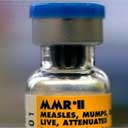
Students were today advised to see a GP if they have not been vaccinated against mumps in an attempt to tackle the growing epidemic.
The National Union of Students (NUS) today warned its members to seek medical advice if they believe they could be susceptible to the disease.
The warning follows reports today that nearly 30,000 people contracted mumps in the first four months of this year compared with just under 2,000 in the same period last year.
Universities UK, which represents vice-chancellors, is preparing to issue emergency guidance to universities on how to deal with the crisis.
People between the ages of 19 and 23 are most at risk of mumps because they missed the introduction of the combined measles, mumps and rubella (MMR) jabs for children in 1988.
Older age groups have built up a natural immunity through exposure, but because cases of mumps dropped so rapidly after the introduction of the jabs, those in their late teens and early 20s have not had the chance to develop a natural defence. And students are even more vulnerable because they live in close contact with one another.
Helen Symons, the vice-president for welfare at the NUS, told EducationGuardian.co.uk today: "The most important thing is to go and get vaccinated. Even if you are unsure about whether or not your have been vaccinated see your GP."
The Department of Health has advised universities and other places where young people routinely mix together for long periods to offer people two doses of the MMR vaccine three months apart. But it is up to individual institutions to make their own decisions.
A Universities UK spokesperson said that all universities will be sent guidance on dealing with the epidemic next week.
"Along with the Department of Health and the Health Protection Agency, universities are encouraging school leavers and other young adults who have not received MMR or received only one dose, to ensure that they take up the offer of a free MMR vaccination."
Sheffield, Birmingham, Kent, Leeds, Manchester, Nottingham and Oxford Universities are known to have instigated their own mass vaccination programmes and other universities are believed to have followed suit.
The symptoms of mumps include fever, loss of appetite and a painful and swollen throat.

